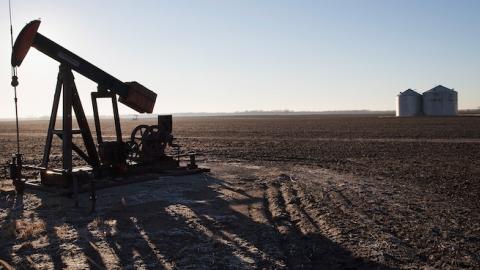The psychopathic thugs of the Islamic State may be about to take over their first country, and it won't be Iraq or Syria.
It could be Libya, and that will be bad news not only for Libyans and their neighbor Egypt. It'll be disastrous news for Saudi Arabia and the rest of the Gulf States — and not only because the Islamic State is their mortal enemy.
The brutal ISIS execution of 21 Coptic Christians has sent shock waves around the world, not least it is proof that the failed state that is post-Ghaddfi Libya is going to slide ever deeper into civil war. The forces of the Islamic State in Libya have already demonstrated their powerful presence by releasing videos of troops and trucks on parade with the ever-present black flag, while Islamic State thugs beat Libyan musicians and burn their drums, guitars, and electronic keyboards as "un-Islamic."
But the group's real goal is Libya's big oil fields south of Benghazi, where until recently North Africa's biggest oil producer was pumping 1.4 million barrels a day. In fact, it was Libya's sudden coming back online in 2013 as a major oil producer that helped to trigger the massive drop in the price of crude over last summer and fall.
The growing civil war in Libya, however, including the battle with the Islamic State, has put all that production in jeopardy. It's now dropped from 1.4 million to less than 300,000; if Islamic State forces manage to disrupt production further and effectively seal what they call "Rome," i.e. Western Europe, from one of its main sources of crude oil, it'll mean a big rebound in the price of oil, perhaps back over $75 a barrel.
That should be good news for the Saudis and other oil-rich Arabs, who've watched the price drop for oil over the last seven months with alarm and foreboding.
But here's the kicker. Rebounding oil prices also means good news for America's shale oil industry, and Canada's tar sands oil producers, who will be able to resume new exploration and drilling of new wells even as they continue to pump out the old in near-record amounts. Any hopes Riyadh, and other OPEC capitals, had of using the price drop to push the US and Canada industries into bankruptcy, will be doomed — if they had any hopes at all.
Instead, a steadily increasing U.S. shale production will mean two things for the world's oil market.
First, an ever-growing supply coupled with an ever-falling demand for imported oil in this country, the world's biggest petroleum consumer, equals more or less permanent lower prices and permanently slimmer wallets for the OPEC monopolists.
Second, it means America can cushion the rest of the world from the sudden impact of an oil price spike due to chaos in Libya. Something similar happened late last year, when American shale production kept ISIS's disruption of Iraqi oil from triggering a major rise in oil prices. In fact, for the first time since the Arab oil embargo of 1973, America is positioned to act as what the experts call a "swing producer," in other words, a country that can adjust the world price of oil by increasing or decreasing its production of its own oil.
Once Congress lifts our outmoded 1975 ban on crude oil exports, our ability to act as swing producer will expand even more, as we're able to sell our product to allies in Western Europe as well as in Asia — yet another cushion against Libya going off line (our light shale crude is very similar to the crude European refineries buy from Libya).
The lesson is: Energy policy and national security policy these days are one and the same. Our domestic shale industry is becoming one of the major tools in our "soft power" strategic arsenal. Maintaining or even increasing U.S. oil production decreases the danger of events in the Middle East disrupting world supply; it also puts pressure on Arab states to deal with their new homegrown danger, namely ISIS, before they lose their comparative leverage in the oil market to U.S. shale.
Clausewitz famously said war was politics by other means. Today energy is war by other means. If America's shale revolution can't help us defeat the Islamic State on the battlefield, it can at least protect the world from the chaos the Islamic State is set to spread, until we do.

















